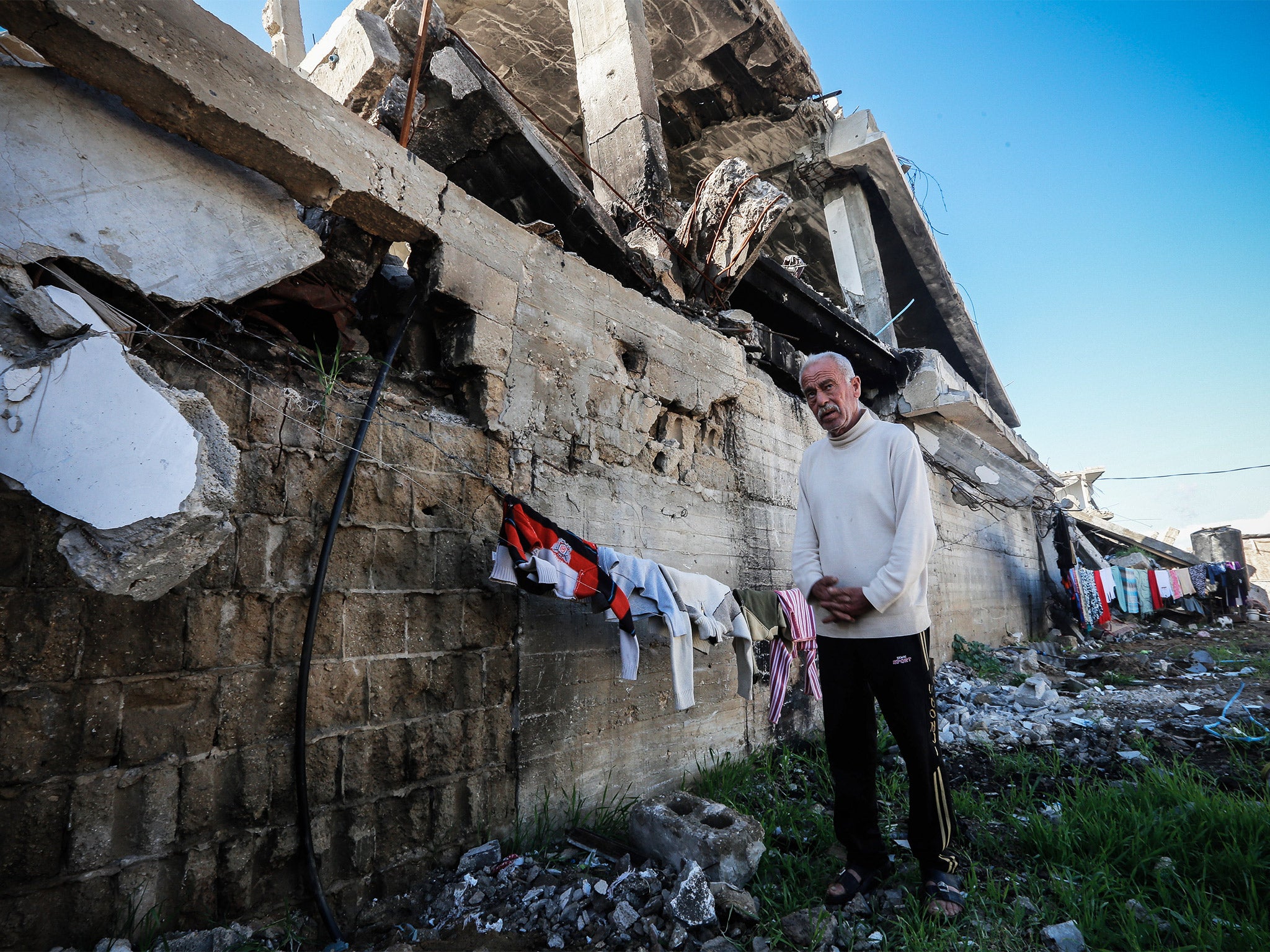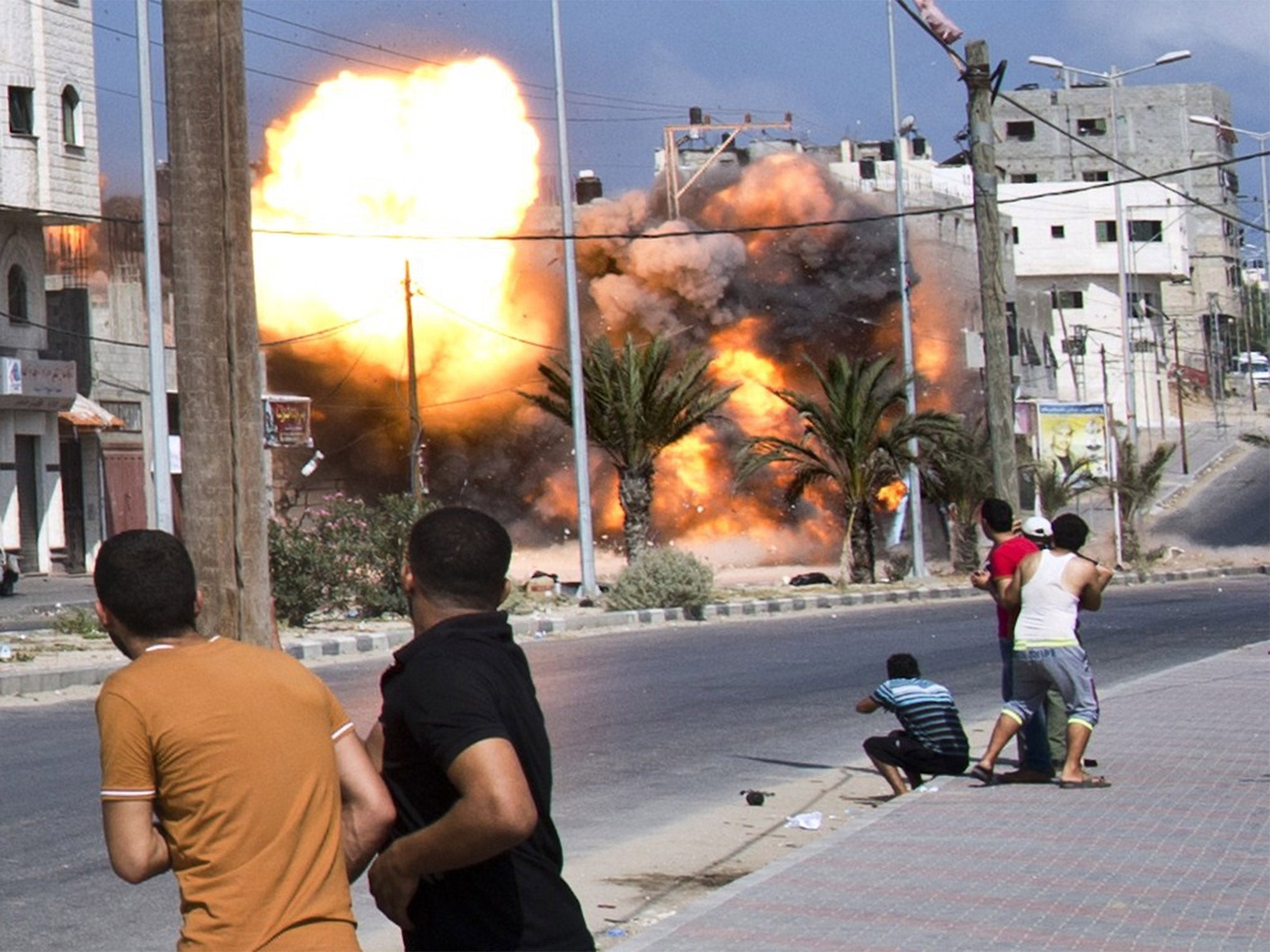'No home and no hope': Palestinians struggling to rebuild their lives amid the Gaza rubble
The few Palestinians rebuilding fear a future that will repeat the past

Your support helps us to tell the story
From reproductive rights to climate change to Big Tech, The Independent is on the ground when the story is developing. Whether it's investigating the financials of Elon Musk's pro-Trump PAC or producing our latest documentary, 'The A Word', which shines a light on the American women fighting for reproductive rights, we know how important it is to parse out the facts from the messaging.
At such a critical moment in US history, we need reporters on the ground. Your donation allows us to keep sending journalists to speak to both sides of the story.
The Independent is trusted by Americans across the entire political spectrum. And unlike many other quality news outlets, we choose not to lock Americans out of our reporting and analysis with paywalls. We believe quality journalism should be available to everyone, paid for by those who can afford it.
Your support makes all the difference.The missiles flattened the row of houses.
Thirteen people died, among them 71-year-old Zaki Wahdan and his two-year-old granddaughter Ghena. Four of Mr Wahdan’s sons, crawling out of the rubble, were arrested by the Israelis. They were released after questioning, only to be killed three days later in further air strikes. Since then, the family has been living in a container with wood panels bolted on.
They look out on to what were five spacious buildings, now crumbling stone and metal, where the extended family used to live. “Forty minutes, 40 minutes, that was how long it took for everything we had built up for so many years to be destroyed”, said Abdullah Wahdan. “Everything we do, we have to do ourselves: we have no one to help us.”
There are no classes held at the nearby the Beit Hanoun Elementary Co-Ed. It is home to 800 people, including the elderly and babies; refugees. Mohammed Obeid, who suffers intense pain from shrapnel injuries to the head from a missile in July, is desperate: “No home and no hope. I don’t know how long we’ll be left this way, I may as well have died from the bombs than live like this.”
These are among the 50,000 homeless four months after the end of the war. There has been little reconstruction. The majority of the damaged factories, which were supposed to have been rebuilt, lie derelict.
Just a fraction of the construction material required has been delivered; only 1.8 per cent of the 5 million tonnes needed. Similarly, just over 1 per cent has been seen of the $5bn (£3.2m) pledged by the international community.
The reconstruction plan was set up between Israel, the Palestinian Authority and the UN. The conditions stipulated by the Israeli government for allowing supplies in have been labelled draconian, designed to prevent Gaza’s development. The Israelis insist they are vital to ensure that the material is not used for military purposes by Hamas. Israel has repeatedly claimed that the group is rearming and intent on trying to replace the network of tunnels destroyed in the last conflict. Air strikes at the weekend – the first since the ceasefire – were, the Israelis say, in response to a rocket attack near the Israeli port of Ashkelon, but also targeted a clandestine cement works.
Each construction project must be approved by Israel. Twelve Gaza firms were licensed to receive cement, but only two have, and even then a tiny portion of what they needed. All of them had to put security precautions in place, described as more akin to tracking weapons.
One of the few bombed factories which has been rebuilt is that of a company belonging to father and son, Hassan and Alla al-Hayek. They started the work during one of the several ceasefires towards the end of the conflict which subsequently broke down.
“It was a risk to start at that time, but we felt there must be reconstruction afterwards and we should be in a position to start. It cost us $120,000 (£77,400), luckily it didn’t get hit when the fighting started again,” said Hassan al-Hayek.
The Israelis, Mr Hayek has learned, have given clearance for the company to receive the supplies. “It seems the delay is due to the UN or the [Palestinian] government. Maybe it’s just paperwork. But even when the cement gets here, there’s a big problem.” Customers are given quotas they can buy, a lot of it is then sold off privately. “People may get together money to buy it, but because aid from the foreign countries hasn’t come through, there’s not enough money to build. Officially, the rate is 540 shekels (£89) a tonne; in the black market it’s 1,600 (£264) shekels.”

Mufid al-Hassaina, the minister for public works and housing in the Palestinian Authority, acknowledges the scale of the problem: “I would say we are in the worst situation since 1948: we have a blockade, huge unemployment and refugees. Yes, there is a growing black market. People have to use it to make money because the international donors’ pledges still haven’t arrived.
“Everyone blames us, the government. But for a proper solution, Israel needs to end the blockade. We have 65 per cent unemployment in a young population… This frustration and anger will lead to another war, also more extremism taking place, unless very urgent action is taken. Some wiser Israeli public figures have begun to realise that.”
The Hilles family in Shujaiya do not have the funds to buy building material to repair their house: repeated requests to international organisations and local officials for shelter have failed. They have moved back to their home, which may collapse because the foundations are damaged.
“Of course I worry,” said 47-year-old Um Ali Hilles. “I have my children, grandchildren living here, what happens if the house falls down? We have people from the UN say it’s unsafe and we shouldn’t stay, we have had a structural engineer say the same thing. But where are we going to move to, the street?”
The Wahdan family has raised some funds in loans and have started building 20 yards from their former homes. “It will take many years to pay it off with the interest, it’s a private loan, the only one we could get” said Abdullah.
“But we all worry there will be another war and… [that] the one we are building now will be destroyed. That seems to be the fate of the Palestinian people.”
Join our commenting forum
Join thought-provoking conversations, follow other Independent readers and see their replies
Comments